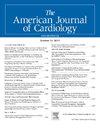睡眠时间与心血管疾病的关系:基于CHARLS的前瞻性队列研究
IF 2.1
3区 医学
Q2 CARDIAC & CARDIOVASCULAR SYSTEMS
引用次数: 0
摘要
背景:睡眠障碍与慢性疾病之间的关系引起了越来越多的学术兴趣。然而,关于睡眠时间与心血管疾病(CVD)之间的纵向关系及其区域分布特征的综合国家数据仍然很少。尤其是对中国人来说。鉴于中国中老年人心血管疾病的沉重负担和明显的地区健康差异,有必要对睡眠的作用进行更深入的调查。目的:本研究旨在利用中国健康与退休纵向研究(CHARLS)的多波数据,系统地研究45岁及以上人群睡眠时间与心血管疾病(CVD)之间的动态关系。该研究还评估了非线性关联和亚组异质性。方法:本前瞻性队列研究纳入了中国健康与退休纵向研究(CHARLS)三波完整数据的参与者:2011年(N = 13078),2013年(N = 9075)和2015年(N = 12397)。通过结构化问卷获得睡眠时间和心血管疾病(CVD)诊断的数据。为了评估睡眠时间与CVD之间的关系,采用了多变量logistic回归模型,并对人口统计学特征、生活方式因素和合并症进行了顺序调整。采用限制三次样条(RCS)模型研究潜在的非线性关联,并进行亚组分析以确定异质性。结果:与没有心血管疾病的人相比,被诊断为心血管疾病(CVD)的人的平均睡眠时间一直较短,例如2011年的平均睡眠时间为6.00小时,而2011年为6.41小时(p < 0.001)。短睡眠时间(定义为少于5小时)与心血管疾病风险升高显著相关,而6至8小时的睡眠时间与最低风险相关。在完全调整后,每增加一个小时的睡眠与心血管疾病的几率降低大约9%有关。限制三次样条(RCS)分析显示,心血管疾病的风险随睡眠时间的增加而降低,呈非线性反比关系。充足睡眠的保护作用在老年人、受教育程度较高的人和不吸烟的人中更为明显。纳入睡眠时间的预测模型在所有研究波中都显示出更高的准确性和灵敏度,曲线下面积(AUC)不断提高。结论:本研究提供了强有力的纵向证据,证明中国中老年人睡眠时间与心血管疾病(CVD)风险呈负相关。具体来说,睡眠时间少于5小时与心血管疾病的风险增加有关,而睡眠时间在6到8小时之间的风险最低。这些发现强调了将睡眠健康纳入旨在预防心血管疾病的临床和公共卫生策略的重要性。本文章由计算机程序翻译,如有差异,请以英文原文为准。
The Relationship Between Sleep Duration and Cardiovascular Disease: A Prospective Cohort Study Based on Charls
Background
The association between sleep disturbances and chronic diseases has attracted growing scholarly interest. Nevertheless, comprehensive national data on the longitudinal relationship between sleep duration and cardiovascular disease (CVD), along with its regional distribution characteristics, remain scarce. particularly for the Chinese population. Given the substantial burden of CVD and pronounced regional health disparities among middle-aged and older adults in China, a deeper investigation into the role of sleep is warranted.
Objectives
This research sought to systematically examine the dynamic relationship between sleep duration and cardiovascular disease (CVD) in individuals aged 45 years and older, employing multiple waves of data from the China Health and Retirement Longitudinal Study (CHARLS). The study also evaluated nonlinear associations and subgroup heterogeneity.
Methods
This prospective cohort study comprised participants with complete data across 3 waves of the China Health and Retirement Longitudinal Study (CHARLS): 2011 (N = 13,078), 2013 (N = 9,075), and 2015 (N = 12,397). Data on sleep duration and cardiovascular disease (CVD) diagnoses were obtained through structured questionnaires. To evaluate the association between sleep duration and CVD, multivariable logistic regression models were utilized, with adjustments sequential adjustments for demographic characteristics, lifestyle factors, and comorbidities. Restricted cubic spline (RCS) models were employed to investigate potential nonlinear associations, and subgroup analyses were conducted to identify heterogeneity.
Results
Individuals diagnosed with cardiovascular disease (CVD) consistently reported shorter average sleep duration compared to their counterparts without CVD, exemplified by an average of 6.00 hours versus 6.41 hours in 2011 (p < 0.001). A short sleep duration, defined as less than 5 hours, was significantly associated with an elevated risk of CVD, whereas a sleep duration of 6 to 8 hours was correlated with the lowest risk. After full adjustment, each additional hour of sleep was associated with an approximate 9% reduction in the odds of CVD. Restricted cubic spline (RCS) analyses indicated a nonlinear inverse relationship, with the risk of CVD decreasing as sleep duration increased. The protective effects of adequate sleep were more pronounced among older adults, individuals with higher educational attainment, and nonsmokers. Predictive models incorporating sleep duration exhibited enhanced accuracy and sensitivity across all study waves, with the area under the curve (AUC) consistently improving.
Conclusions
This study provides strong longitudinal evidence of an inverse relationship between sleep duration and cardiovascular disease (CVD) risk among middle-aged and older Chinese adults. Specifically, sleep duration of less than 5 hours were associated with an elevated risk of CVD, whereas sleeping between 6 and 8 hours was correlated with the lowest risk. These findings underscore the importance of incorporating sleep health into clinical and public health strategies aimed at preventing cardiovascular disease.
求助全文
通过发布文献求助,成功后即可免费获取论文全文。
去求助
来源期刊

American Journal of Cardiology
医学-心血管系统
CiteScore
4.00
自引率
3.60%
发文量
698
审稿时长
33 days
期刊介绍:
Published 24 times a year, The American Journal of Cardiology® is an independent journal designed for cardiovascular disease specialists and internists with a subspecialty in cardiology throughout the world. AJC is an independent, scientific, peer-reviewed journal of original articles that focus on the practical, clinical approach to the diagnosis and treatment of cardiovascular disease. AJC has one of the fastest acceptance to publication times in Cardiology. Features report on systemic hypertension, methodology, drugs, pacing, arrhythmia, preventive cardiology, congestive heart failure, valvular heart disease, congenital heart disease, and cardiomyopathy. Also included are editorials, readers'' comments, and symposia.
 求助内容:
求助内容: 应助结果提醒方式:
应助结果提醒方式:


